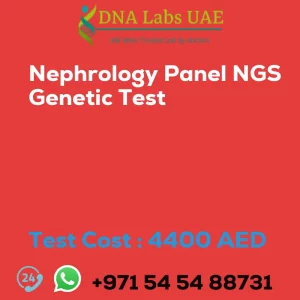ATP6V0A4 Gene Renal Tubular Acidosis Distal Autosomal Recessive Genetic Test
Test Name: ATP6V0A4 Gene Renal tubular acidosis distal autosomal recessive Genetic Test
Components: ATP6V0A4 gene analysis
Price: 4400.0 AED
Sample Condition: Blood or Extracted DNA or One drop Blood on FTA Card
Report Delivery: 3 to 4 Weeks
Method: NGS Technology
Test type: Hepatology Nephrology Endocrinology Disorders
Doctor: General Physician
Test Department: Genetics
Pre Test Information: Clinical History of Patient who is going for ATP6V0A4 Gene Renal tubular acidosis, distal, autosomal recessive NGS Genetic DNA Test. A Genetic Counselling session to draw a pedigree chart of family members affected with ATP6V0A4 Gene Renal tubular acidosis, distal, autosomal recessive NGS Genetic DNA Test gene ATP6V0A4
Test Details
ATP6V0A4 gene renal tubular acidosis, distal, autosomal recessive NGS genetic test is a type of genetic test that is used to diagnose distal renal tubular acidosis (dRTA) caused by mutations in the ATP6V0A4 gene.
dRTA is a condition characterized by the inability of the kidneys to effectively remove acid from the blood, leading to a buildup of acid in the body. It can result in symptoms such as excessive thirst, frequent urination, dehydration, and electrolyte imbalances.
The ATP6V0A4 gene provides instructions for making a protein called V-ATPase, which is responsible for maintaining the proper acid-base balance in the kidneys. Mutations in this gene can disrupt the function of V-ATPase, leading to dRTA.
The NGS (next-generation sequencing) genetic test involves analyzing the DNA of an individual to identify mutations in the ATP6V0A4 gene. This test can provide a definitive diagnosis of dRTA and help guide treatment decisions.
Autosomal recessive inheritance means that both copies of the ATP6V0A4 gene must be mutated in order for an individual to develop dRTA. If only one copy of the gene is mutated, the individual is considered a carrier and does not typically show symptoms of the condition.
Overall, the ATP6V0A4 gene renal tubular acidosis, distal, autosomal recessive NGS genetic test is a valuable tool in the diagnosis and management of dRTA. It can help identify individuals at risk for the condition, provide genetic counseling, and guide treatment decisions.
| Test Name | ATP6V0A4 Gene Renal tubular acidosis distal autosomal recessive Genetic Test |
|---|---|
| Components | |
| Price | 4400.0 AED |
| Sample Condition | Blood or Extracted DNA or One drop Blood on FTA Card |
| Report Delivery | 3 to 4 Weeks |
| Method | NGS Technology |
| Test type | Hepatology Nephrology Endocrinology Disorders |
| Doctor | General Physician |
| Test Department: | Genetics |
| Pre Test Information | Clinical History of Patient who is going for ATP6V0A4 Gene Renal tubular acidosis, distal, autosomal recessive NGS Genetic DNA Test. A Genetic Counselling session to draw a pedigree chart of family members affected with ATP6V0A4 Gene Renal tubular acidosis, distal, autosomal recessive NGS Genetic DNA Test gene ATP6V0A4 |
| Test Details |
ATP6V0A4 gene renal tubular acidosis, distal, autosomal recessive NGS genetic test is a type of genetic test that is used to diagnose distal renal tubular acidosis (dRTA) caused by mutations in the ATP6V0A4 gene. dRTA is a condition characterized by the inability of the kidneys to effectively remove acid from the blood, leading to a buildup of acid in the body. It can result in symptoms such as excessive thirst, frequent urination, dehydration, and electrolyte imbalances. The ATP6V0A4 gene provides instructions for making a protein called V-ATPase, which is responsible for maintaining the proper acid-base balance in the kidneys. Mutations in this gene can disrupt the function of V-ATPase, leading to dRTA. The NGS (next-generation sequencing) genetic test involves analyzing the DNA of an individual to identify mutations in the ATP6V0A4 gene. This test can provide a definitive diagnosis of dRTA and help guide treatment decisions. Autosomal recessive inheritance means that both copies of the ATP6V0A4 gene must be mutated in order for an individual to develop dRTA. If only one copy of the gene is mutated, the individual is considered a carrier and does not typically show symptoms of the condition. Overall, the ATP6V0A4 gene renal tubular acidosis, distal, autosomal recessive NGS genetic test is a valuable tool in the diagnosis and management of dRTA. It can help identify individuals at risk for the condition, provide genetic counseling, and guide treatment decisions. |








